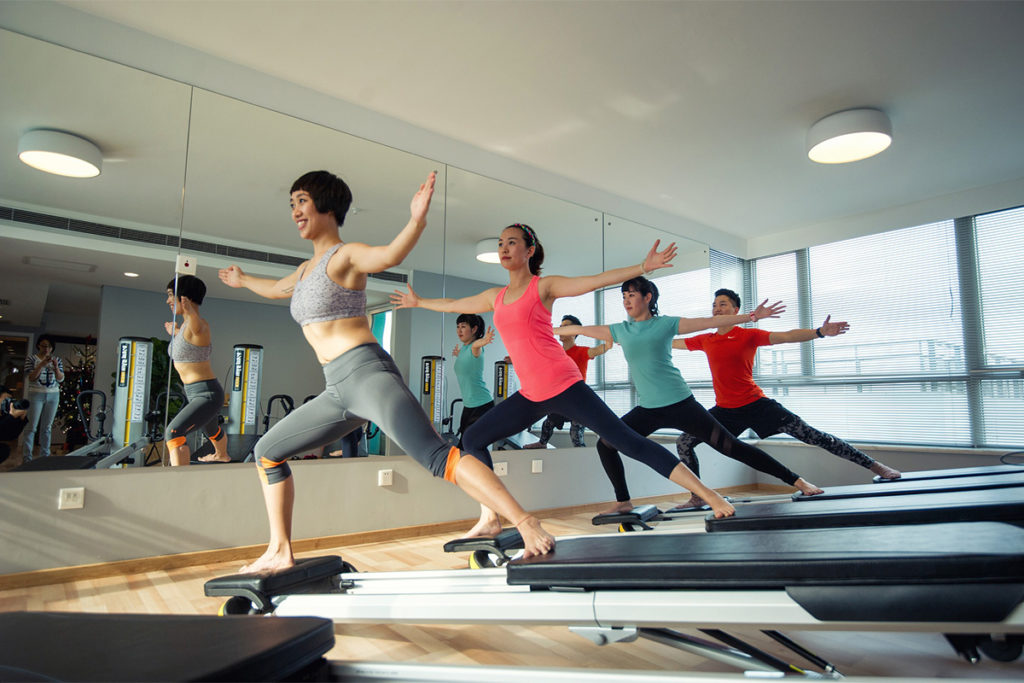How to Become a Spa Professional
Respect the rich history of spas and highlight your versatility and holistic mindset when seeking employment.
As the fitness industry embraces wellness concepts such as mental training, mindful movement and holistic programming, now more than ever the spa world offers viable career opportunities. Why? One reason is that it has long embraced these same healthy goals. The fitness professional who is curious about employment in the spa industry must take methodical steps toward discovering whether or not this specialty field is a good fit.
Spa History and Legacy
Historical references to the word “spa” date back hundreds of years (Jackson 1990). People made frequent pilgrimages to sites around the globe that boasted warm or hot springs for bathing (Routh, et al 1996) These pilgrims discovered proven, therapeutic benefits from different types of warm water. The word “spa” developed from the claim that people gained “health from the water,” or “solus per aquam” in Latin. As therapies and treatments emerged from these geographic centers of natural springs, dry treatments on land—such as what is known today as the traditional massage—also came to the fore.
It’s of utmost importance to be familiar with the historical significance of water in the spa environment. To supplement the historical reference, here’s a more expanded definition:
- “S” stands for both “school” and “sanctuary” (where individuals go to learn something about themselves in a safe environment);
- “P” stands for “palace” (where people receive the royal treatment);
- “A” stands for “abode” (where people paradoxically feel at home in a new environment).
The spa environment is dramatically different from the traditional fitness facility, and it is vital to realize this before pursuing a position. Spas emphasize the holistic approach to wellness from an aquatic, historical perspective.
Katherine Mark is a group fitness instructor and mindful personal trainer at the Golden Door Spa at the Boulders Resort in Carefree, Arizona. She enjoys exploring both positions in the spa environment as opposed to a traditional gym because, “Most spa goers [are] looking for ways to make their lives healthier,” she says. “[They] are looking for ways to motivate themselves to become healthier in both mind and body. They tend to be in a more positive, open frame of mind.”
Lara Davidson, spa director at The Lodge at Pebble Beach, agrees. “I enjoy hiring candidates who understand the spa’s unique environment and holistic approach,” she says. “When a potential candidate doesn’t even know the origin and philosophy of the word ‘spa,’ I’m not going to be impressed by a resume. After that, I need versatility.”
Versatility and Credentials
Being cross-trained and having multiple certifications is an asset when looking for spa employment. Management will be more willing to hire a fitness professional who can teach a variety of classes. If a candidate is a certified lifestyle coach as well, she jumps to the top of the list of potential candidates. Spas offer many types of simultaneous classes per day, more than what is offered by a traditional facility, so the individual who can teach multiple classes on a schedule and offer personal training sessions will receive priority. A strong applicant will also possess:
- a cardiopulmonary resuscitation certification
- current, internationally recognized fitness certifications in group fitness and personal training
- specialty certificates in niche disciplines such as yoga (for a yoga instructor) or special populations (for a personal trainer)
- membership in discipline-specific professional organizations.
Barry Shingle, director of guest activities and fitness of Rancho La Puerta Spas based in Tecate, México, says “our standards are high in hiring staff, so we really look favorably on those who come to us with allegiances to professional organizations in their fields of expertise, especially in all mind-body fields. Ultimately, such affiliations help bring our spa recognition as well.”
Job-seeking
One of the best ways to find job opportunities and get a feel for the unique spa experience is to visit local spas. Primarily, spas require staff members to understand how to incorporate the holistic mission and vision statements into all classes and personal training sessions (for more about this, read
Secrets of Spa Fitness). To be sure, spa classes address movement, but there is also an emphasis on helping guests embark on self-discovery as well.
Visiting different types of spas in your area (if available) will acquaint you with both the different types of spas and the spa approach to fitness. Membership day spas usually offer a few different types of classes and traditional personal training sessions each day and have a large core base of members from the local community. These typically are fitness centers with a self-contained spa, or vice-versa. Conversely, destination spas in remote locations usually lack a huge core of regular members and feature complete menus that revolve around mindful movement, and have mind-body personal trainers on staff.
If possible, find a mentor instructor or trainer currently employed in the spa industry and “shadow” him or her during a typical day or two. This will allow you to experience all that is involved in spa fitness, both with guests and behind the scenes. The goal is to learn how spa fitness incorporates its mission into personal training and classes, how it integrates all five senses, and how fitness is part of a much larger picture than in a traditional facility.
Experience, Placement and Qualifications
While spas do not typically require candidates to have spa fitness experience, having fitness experience is a must. A resume that boasts significant experience with personal training, leading different types of classes, or working with special populations will move to the top of the pile. On the other hand, a candidate who has neither spa nor fitness experience is not appropriate as a new-hire, but may begin as an intern.
Spa positions are as varied as the different types of spas themselves. Just as in the traditional fitness facility, a personal trainer or instructor at a spa may be an independent contractor, employee or something in between. Common job titles include:
- mind-body personal trainer
- group fitness instructor for land
- mind-body group fitness instructor for land
- group fitness instructor for aquatics
- mind-body group fitness instructor for aquatics
Since spa schedules also feature nontraditional programming, being able to teach breathing classes, brain training, special populations, barefoot programming and balance training will command any spa director’s attention. Finally, in-depth aquatic fitness training may also provide more versatility in today’s job market. “Spas are almost always synonymous with water, and almost always emphasize aquatics,” says Michele Regev, who is based in Southern California. “I acquired comprehensive aquatic training before applying to teach classes in the spa market, where aquatic classes figure high on the fitness menu.”
Benefits and Challenges
The benefits of working in the spa environment include working in a relaxing and nurturing environment. Spas offer a treat for the senses. From aromatherapy to relaxing music, soft candlelight, fruit smoothies and bouillon tastings, to discounts toward spa treatments, working in a spa can be quite appealing. Furthermore, the sense of interdependence and congruency among departments gives all team members the feeling of contributing to a greater good. For example, products like aromatherapy sprays and candles used in classes are sold in retail outlets, staff is often cross-utilized and food and beverage outlets offer healthy, organic and environmentally conscious options.
Be prepared for the high expectations of spa-goers who frequent (and compare) spas around the world. Oftentimes, spa professionals must rise to the occasion and exude an extra ounce of customer service. The instructor or trainer who thrives on enthusiasm and energy from participants may not be best suited for the spa environment. This is because many spas do not have regular members and enjoy new faces each day as tourists come and go.
Diane Allan, fitness training coordinator, group exercise instructor and personal trainer at the Golden Door Spa in Escondido, California, says that spa fitness challenges trainers to “teach to new faces each week, and to assess guest needs in 1 week and design a home program for them until they return. While trainers at the Golden Door do not see the results week to week, many of our trainers stay in contact with our guests via email and provide updates and words of encouragement and they often see amazing changes in the guests they have worked with when they return.”
For instructors, each class is a completely new experience. The professional who wants to watch participants and clients obtain measurable gains in strength, flexibility and cardiovascular markers over time should interview with spas that have a strong client base from the local community (membership spas) instead of spas that cater to transients (destination spas).
Sanctuary, Palace, Abode
Spas continue to attract job-seekers as more and more people come to view these places as safe, rejuvenating havens from the stresses of daily life. For the fitness professional wishing to pursue a holistic approach to training individuals and groups, the spa environment offers an ideal place to pursue an exciting career opportunity.
Lawrence Biscontini, MA
Lawrence Biscontini, MA, has made fitness history as a mindful movement specialist, winning awards that include the Inner IDEA Visionary Award. He is a philanthropist, presenter, keynoter, and course development specialist for various companies, including ACE, AFAA, FIT and NASM. He also serves on the advisory boards for the International Council on Active Aging and Power Music®, and is an International Spa Association reporter-in-the-field for its #ISPAInterviews series. Lawrence teaches with yoga RYT 500 and decades-long certification experience. His company, Fitness Group 2000 offers scholarships to professional conferences and competitions on several continents. Lawrence runs fit camps in Puerto Rico in the winter months and has authored more than a dozen books.






